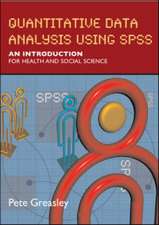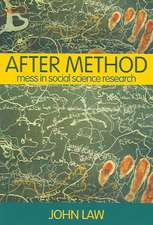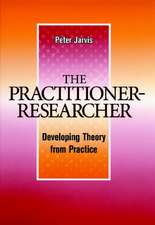Designing and Conducting Research in Education
Autor Clifford J. Drew, Michael L. Hardman, John L. Hospen Limba Engleză Paperback – apr 2008
Key features:
o Simulations and feedback that may be used in class sessions for both individual and small group participation
o Pedagogy to help students plan and conduct a research project in an actual classroom
o Examples that demonstrate and explain what constitutes good and poor research questions
o Case studies and 'real life' examples related to education
o A Student Web site that provides students with the opportunity to interact with contemporary articles.
This book provides an introduction to research that emphasizes the fundamental concepts of planning and design. It is designed to be a core text for the very first course on research methods.
Preț: 924.13 lei
Preț vechi: 1015.52 lei
-9% Nou
Puncte Express: 1386
Preț estimativ în valută:
176.84€ • 189.10$ • 147.44£
176.84€ • 189.10$ • 147.44£
Carte tipărită la comandă
Livrare economică 18 aprilie-02 mai
Preluare comenzi: 021 569.72.76
Specificații
ISBN-13: 9781412960748
ISBN-10: 1412960746
Pagini: 432
Dimensiuni: 203 x 254 x 16 mm
Greutate: 0.75 kg
Ediția:1
Editura: SAGE Publications
Colecția Sage Publications, Inc
Locul publicării:Thousand Oaks, United States
ISBN-10: 1412960746
Pagini: 432
Dimensiuni: 203 x 254 x 16 mm
Greutate: 0.75 kg
Ediția:1
Editura: SAGE Publications
Colecția Sage Publications, Inc
Locul publicării:Thousand Oaks, United States
Recenzii
“These authors have done a masterful job in unpacking the fundamental issues in research and disciplined inquiry. They consistently help their readers to understand that in research, as in life, it essentially boils down to validity and reliability.”
—Wayne H. Slater, University of Maryland
“The authors achieve an authentic voice in their text. They explain concepts clearly and concisely, while providing appropriate examples to support their assertions. Finally, the authors engage the novice researcher (or consumer of research) with engaging ideas and prose . . . they consistently unpack complex, abstract concepts in a clear, lucid fashion.”
—Wayne H. Slater, University of Maryland
“The book is perfect for introductory students and does not swim in its own self-importance. The language is top notch, the examples are helpful, and the graphic features (tables, figures) are uncomplicated and contain important information in an easy-to-understand format.”
—John A. Huss, Northern Kentucky University
"The simulations and activities provide valuable engaging experiences for a range of “school leaders.” They are well thought through and provide reflection on issues ranging from confidentiality to professional ethics."
—James E. Barr, Nicholls State University
“The Student Workbook and Simulated Problems is a valuable component that clearly differentiates this research textbook from others. I highly recommend this workbook as a valuable component to any research course, regardless of level. The book’s treatment of time-series designs is also valuable.”
—Alfred P. Rovai, Regent University
—Wayne H. Slater, University of Maryland
“The authors achieve an authentic voice in their text. They explain concepts clearly and concisely, while providing appropriate examples to support their assertions. Finally, the authors engage the novice researcher (or consumer of research) with engaging ideas and prose . . . they consistently unpack complex, abstract concepts in a clear, lucid fashion.”
—Wayne H. Slater, University of Maryland
“The book is perfect for introductory students and does not swim in its own self-importance. The language is top notch, the examples are helpful, and the graphic features (tables, figures) are uncomplicated and contain important information in an easy-to-understand format.”
—John A. Huss, Northern Kentucky University
"The simulations and activities provide valuable engaging experiences for a range of “school leaders.” They are well thought through and provide reflection on issues ranging from confidentiality to professional ethics."
—James E. Barr, Nicholls State University
“The Student Workbook and Simulated Problems is a valuable component that clearly differentiates this research textbook from others. I highly recommend this workbook as a valuable component to any research course, regardless of level. The book’s treatment of time-series designs is also valuable.”
—Alfred P. Rovai, Regent University
Cuprins
Preface
Part I: Overview of Research
Chapter 1: The Foundations of Research
Chapter Objectives
Perspectives on Educational Research
Defining Ways of Conducting Research
Foundations of Research
Research Types and Methods in Brief
The Research Process
Summary
About Simulations
Simulation 1.1
Chapter 2: The Research Process
Chapter Objectives
Finding a Topic to Research
Steps in the Scientific Method
Summary
Simulation 2.1
Chapter 3: Ethical Issues in Conducting Research
Chapter Objectives
Ensuring the Protection of Human Participants
Ethical Considerations in Quantitative and Qualitative Research
Monitoring Ethics in Research: Institutional Review Boards
Ethics and Professionalism
Summary
Simulation 3.1
Chapter 4: Participant Selection and Assignment
Chapter Objectives
Participant Selection
Participant Assignment
Summary
Simulation 4.1
Chapter 5: Measures and Instruments
Chapter Objectives
Selection and Definition of Criterion Measures
Instruments or Tasks
Summary
Simulation 5.1
Part II: Research Methods and Designs
Chapter 6: Quantitative Research Methodologies
Chapter Objectives
Defining Quantitative Research
Basic Experimental Design Formats
Traditional Group Experimental Designs
After the Design: Analysis and Interpretation
Summary
Simulation 6.1
Chapter 7: Designing Non-Experimental Research
Chapter Objectives
Defining Experimental and Non-Experimental Research
Survey Research
Observation Studies
Summary
Simulation 7.1
Chapter 8: Introduction to Qualitative Research and Mixed-Methods Design
Chapter Objectives
An Overview of Qualitative Research
Mixed Methods
Summary
Simulation 8.1
Chapter 9: Research Design Pitfalls
Chapter Objectives
Types of Design Validity
Threats to Experimental Design Validity
Standards of Rigor
Summary
Simulation 9.1
Part III: Data Analysis and Results Interpretation
Chapter 10: Statistics Choices
Statistics: What and Why
The Decision Tree: Moving from the Question to the Analysis
The Importance of Data Type in Selecting Statistics
Summary
Simulation 10.1
Simulation 10.2
Chapter 11: Data Tabulation
Chapter Objectives
Aggregating Data
Tables
Graphing Data
Summary
Simulation 11.1
Chapter 12: Descriptive Statistics
Chapter Objectives
Categories of Descriptive Statistics
Summary
Simulation 12.1
Simulation 12.2
Chapter 13: Inferential Statistics
Chapter Objectives
General Background of Inferential Statistics
Difference Questions: Which Statistic and When
Relationship Questions: Which Statistic and When
Summary
Simulation 13.1
Simulation 13.2
Chapter 14: Analyzing Qualitative Data
Chapter Objectives
Preliminary Analysis
Post Data-Gathering Analysis
Inductive and Deductive Analyses
Phenomenological Analytical Techniques
Reporting Qualitative Research
Summary
Simulation 14.1
Chapter 15: Interpreting Results
Research as an Integrated Process
Interpretation of Results
Acquiring Interpretation Skills for Research
Summary
Simulation 15.1
Appendix A: Table of Random Numbers
References
Glossary/Index
Part I: Overview of Research
Chapter 1: The Foundations of Research
Chapter Objectives
Perspectives on Educational Research
Defining Ways of Conducting Research
Foundations of Research
Research Types and Methods in Brief
The Research Process
Summary
About Simulations
Simulation 1.1
Chapter 2: The Research Process
Chapter Objectives
Finding a Topic to Research
Steps in the Scientific Method
Summary
Simulation 2.1
Chapter 3: Ethical Issues in Conducting Research
Chapter Objectives
Ensuring the Protection of Human Participants
Ethical Considerations in Quantitative and Qualitative Research
Monitoring Ethics in Research: Institutional Review Boards
Ethics and Professionalism
Summary
Simulation 3.1
Chapter 4: Participant Selection and Assignment
Chapter Objectives
Participant Selection
Participant Assignment
Summary
Simulation 4.1
Chapter 5: Measures and Instruments
Chapter Objectives
Selection and Definition of Criterion Measures
Instruments or Tasks
Summary
Simulation 5.1
Part II: Research Methods and Designs
Chapter 6: Quantitative Research Methodologies
Chapter Objectives
Defining Quantitative Research
Basic Experimental Design Formats
Traditional Group Experimental Designs
After the Design: Analysis and Interpretation
Summary
Simulation 6.1
Chapter 7: Designing Non-Experimental Research
Chapter Objectives
Defining Experimental and Non-Experimental Research
Survey Research
Observation Studies
Summary
Simulation 7.1
Chapter 8: Introduction to Qualitative Research and Mixed-Methods Design
Chapter Objectives
An Overview of Qualitative Research
Mixed Methods
Summary
Simulation 8.1
Chapter 9: Research Design Pitfalls
Chapter Objectives
Types of Design Validity
Threats to Experimental Design Validity
Standards of Rigor
Summary
Simulation 9.1
Part III: Data Analysis and Results Interpretation
Chapter 10: Statistics Choices
Statistics: What and Why
The Decision Tree: Moving from the Question to the Analysis
The Importance of Data Type in Selecting Statistics
Summary
Simulation 10.1
Simulation 10.2
Chapter 11: Data Tabulation
Chapter Objectives
Aggregating Data
Tables
Graphing Data
Summary
Simulation 11.1
Chapter 12: Descriptive Statistics
Chapter Objectives
Categories of Descriptive Statistics
Summary
Simulation 12.1
Simulation 12.2
Chapter 13: Inferential Statistics
Chapter Objectives
General Background of Inferential Statistics
Difference Questions: Which Statistic and When
Relationship Questions: Which Statistic and When
Summary
Simulation 13.1
Simulation 13.2
Chapter 14: Analyzing Qualitative Data
Chapter Objectives
Preliminary Analysis
Post Data-Gathering Analysis
Inductive and Deductive Analyses
Phenomenological Analytical Techniques
Reporting Qualitative Research
Summary
Simulation 14.1
Chapter 15: Interpreting Results
Research as an Integrated Process
Interpretation of Results
Acquiring Interpretation Skills for Research
Summary
Simulation 15.1
Appendix A: Table of Random Numbers
References
Glossary/Index















